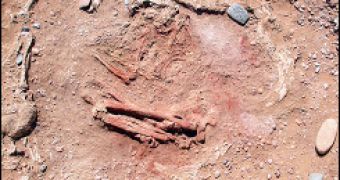Many human civilizations are known to have made human sacrifices. Aztecs are perhaps the most famous for their cruel carnages, when hundreds to thousands of victims were killed and their still beating hearts were pulled out of their chests and offered to the gods. In fact, most pre-Columbian civilizations made human sacrifices, including Maya, Inca (which sacrificed only children in a less bloody way) and Araucans. Two thousands years ago, in Europe, the Celts and Dacians too made human sacrifices to their gods.
Now, a team of French archaeologists has found what might be the oldest proof of human sacrifice in Sudan, Africa, at the biggest Neolithic ("New Stone Age") site discovered on the continent for years, in El Kadada village, a three-hour drive north of Khartoum.
The tomb of a 5,500-year-old man surrounded by three sacrificed humans, two dogs and exquisite ceramics were dug by Neolithic expert Jacques Reinhold and his Austrian wife, Ulla.
"This is the oldest proof of human sacrifice in Sudan, in Egypt, in Africa. I don't know of another example in Africa at this level... We don't have anything as strong in other excavations in other countries," said Reinhold, who was the director of the Section Francaise de la Direction des Antiquities for 25 years.
Reinhold led the dig for several months and stated the tomb is the most important African Neolithic discovery since the 1990s. Neolithic marks a human technological revolution, when man evolved from hunter gatherers into farmers, producing his own food and establishing a forever breakage from nature, that changed the human society, leading to developed civilizations.
"The find is nearly 1,000 years older what many consider Sudan's most spectacular discoveries of human sacrifice -- scores of bodies buried together," said Reinhold.
Neolithic settlers may have found the El Kadada area, close to the modern town of Shendi and on the banks of the Nile, as highly fertile.
The archaeologists also discovered urns, stones for grinding wheat into flour, beds and bracelets at the digging site, which will be donated to the National Museum in Khartoum.

 14 DAY TRIAL //
14 DAY TRIAL //